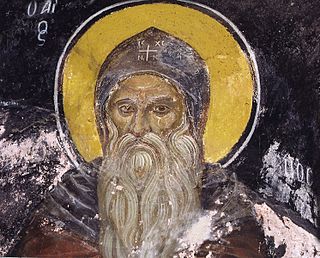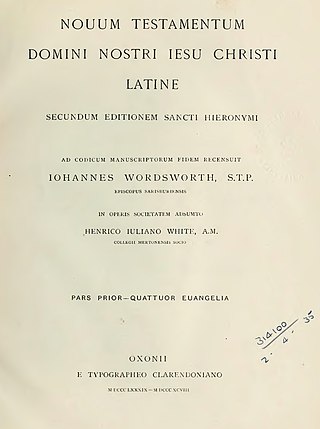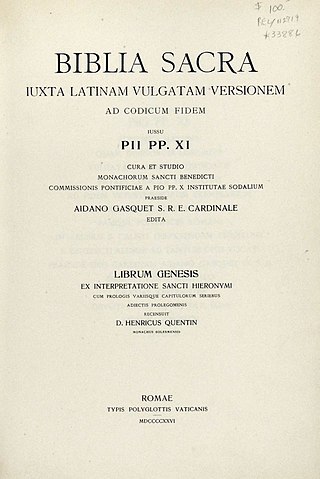Chalcedonian Christianity is a term referring to the branches of Christianity that accept and uphold theological resolutions of the Council of Chalcedon, the fourth ecumenical council, held in 451. Chalcedonian Christianity accepts the Christological Definition of Chalcedon, a Christian doctrine concerning the union of two natures in one hypostasis of Jesus Christ, who is thus acknowledged as a single person (prosopon). Chalcedonian Christianity also accepts the Chalcedonian confirmation of the Niceno-Constantinopolitan Creed, thus acknowledging the commitment of Chalcedonism to Nicene Christianity.

Nikephoros Kallistos Xanthopoulos was a Greek ecclesiastical historian and litterateur of the late Byzantine Empire. His most popular work, the voluminous Ecclesiastica historia, constitutes a significant documentary source on primitive Christianity and its doctrinal controversies, as well as for hagiographical, liturgical, and legendary texts from Byzantine culture.
Eshtemoa, meaning obedience or "'place where prayer is heard", was an ancient city in the Judaean Mountains, mentioned several times in the Hebrew Bible. It is also the name of two people mentioned in the First Book of Chronicles.
The Apocryphon of Ezekiel is an apocryphal book, written in the style of the Old Testament, as revelations of Ezekiel. It survives only in five fragments including quotations in writings by Epiphanius, Clement of Rome and Clement of Alexandria, and the Chester Beatty Papyri 185. It is likely to have been composed c. 50 BC – 50 AD, although some scholars suggest a date closer to 7 AD.
The following is a timeline of major events in post-classical history from the 5th to 15th centuries, loosely corresponding to the Old World Middle Ages, intermediate between Late antiquity and the early modern period.

Aristides the Athenian was a 2nd-century Christian Greek author who is primarily known as the author of the Apology of Aristides. His feast day is August 31 in Roman Catholicism and September 13 in Eastern Orthodoxy.

Pambo was a Coptic Desert Father of the fourth century and disciple of Anthony the Great. His feast day is July 18 among the Oriental Orthodox, Eastern Orthodox, and Catholic churches.

Henry Julian White was an English biblical scholar.

The Lexikon des Mittelalters is a German encyclopedia on the history and culture of the Middle Ages. Written by authors from all over the world, it comprises more than 36,000 articles in 9 volumes. Historically the works range from Late Antiquity to about 1500, covering the Byzantine Empire and the Arab world.
Miroslav Marcovich was a Serbian-American philologist and university professor.
Oliver Chase Quick was an English theologian, philosopher, and Anglican priest.

Donald Fairbairn is a scholar specializing in patristic soteriology and Cyril of Alexandria who currently teaches at Gordon-Conwell Theological Seminary.
The Synod of Jassy or Synod of Iași, was convened in Iași in Moldavia between 15 September and 27 October 1642 by the Ecumenical Patriarch Parthenius I of Constantinople, with the support of the Moldavian Prince Vasile Lupu.

The Oxford Vulgate is a critical edition of the Vulgate version of the New Testament produced by scholars of the University of Oxford, and published progressively between 1889 and 1954 in 3 volumes.
Celia Martin Chazelle is a Canadian-American historian and author. She is a professor of history at The College of New Jersey.

The Benedictine Vulgate, also called Vatican Vulgate or Roman Vulgate, is a critical edition of the Vulgate version of the Old Testament, Catholic deuterocanonical books included.
Philip Rousseau was a scholar of early Christianity who held the Andrew W. Mellon Distinguished Professor of Early Christian Studies and was the director of the Center for the Study of Early Christianity at Catholic University of America.

The Cambridge Companion to Augustine refers to two volumes of essays about Augustine of Hippo and Augustinianism published in 2001 and 2014 by Cambridge University Press, with largely disjoint contents. The editors of the first version were Eleonore Stump and Norman Kretzmann, and for the second version Stump and David Vincent Meconi.

Ecumenism, Christian Origins and the Practice of Communion is a 2000 book about Christian ecumenism by the Anglican theologian Nicholas Sagovsky. It was published by Cambridge University Press.
This page is based on this
Wikipedia article Text is available under the
CC BY-SA 4.0 license; additional terms may apply.
Images, videos and audio are available under their respective licenses.









